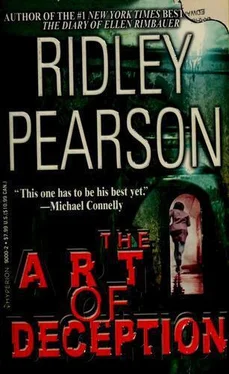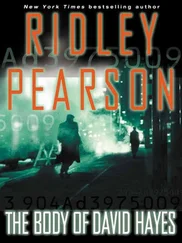Ridley Pearson - The Art of Deception
Здесь есть возможность читать онлайн «Ridley Pearson - The Art of Deception» весь текст электронной книги совершенно бесплатно (целиком полную версию без сокращений). В некоторых случаях можно слушать аудио, скачать через торрент в формате fb2 и присутствует краткое содержание. Жанр: Триллер, на английском языке. Описание произведения, (предисловие) а так же отзывы посетителей доступны на портале библиотеки ЛибКат.
- Название:The Art of Deception
- Автор:
- Жанр:
- Год:неизвестен
- ISBN:нет данных
- Рейтинг книги:3 / 5. Голосов: 1
-
Избранное:Добавить в избранное
- Отзывы:
-
Ваша оценка:
- 60
- 1
- 2
- 3
- 4
- 5
The Art of Deception: краткое содержание, описание и аннотация
Предлагаем к чтению аннотацию, описание, краткое содержание или предисловие (зависит от того, что написал сам автор книги «The Art of Deception»). Если вы не нашли необходимую информацию о книге — напишите в комментариях, мы постараемся отыскать её.
The Art of Deception — читать онлайн бесплатно полную книгу (весь текст) целиком
Ниже представлен текст книги, разбитый по страницам. Система сохранения места последней прочитанной страницы, позволяет с удобством читать онлайн бесплатно книгу «The Art of Deception», без необходимости каждый раз заново искать на чём Вы остановились. Поставьте закладку, и сможете в любой момент перейти на страницу, на которой закончили чтение.
Интервал:
Закладка:
“I don’t know anything about any blood being under that car.”
“That’s the wrong answer,” LaMoia said. His cell phone rang. “And you know what that is?” he asked the suspect, viewing caller-ID. “That would be my court order coming through to search this dump.” He silenced the ringing of the phone with the push of a button and held the device to his ear. “LaMoia,”
he announced into the phone. “Talk to me, darlin’. Tell me what I want to hear.”
Voice Male
A blinking message light was no great surprise to Matthews as she returned to her office that evening. In what had become an automatic gesture, she dialed in to retrieve her voice mail, which announced that she had six messages. She cringed as she intu-itively anticipated that at least one of these could be from Deputy Sheriff Nathan Prair. He’d attached himself to her once before, and now, with their renewed acquaintance, with the description of the brown uniform in the parking garage, she felt nearly certain she would need to deal with him again.
The first message on the system was an earlier one from LaMoia asking for her company when he went to interview a possible peeper victim, Tina Oblitz. He explained Oblitz’s prior attempts to “cancel the order,” as LaMoia put it, and how he hoped he might gain insight into Hebringer’s and Randolf’s “vanishing act.”
She felt closer to John-his teasing bordered on flirting. His earlier struggle with the OxyContin had revealed a more human LaMoia. Some people were helped by such challenges, and LaMoia had the makings. She scribbled down his initials-this was how she took note of all such phone messages-a reminder to return his call.
The second message caught her by surprise, and because of her premonition, she mistakenly assigned the voice initially to Prair, though her brain quickly straightened her out. “Lieutenant Matthews?” It was Ferrell Walker. “I wondered if my gift helped you out? I don’t have a phone, so … listen … I’ll call you back.”
Her image was not of Walker at the ME’s half out of his mind with grief, nor was it the boyish man delivering his sister’s soiled sweatshirt as a gift; it was, instead, an image of Walker in his bloodied apron standing in the falling rain, his eyes bloodshot with fatigue but looking up and down her body, his wet, matted hair. One black rubber glove, one yellow-she remembered so many details of that interview.
“Pass,” she said aloud, deleting the message.
At the start of the third message, the first vestiges of concern warmed her, spreading through her like a shot of alcohol. “Me again.” She was mad at herself for being distracted by Prair, only to be blindsided by the much more obvious, emotionally unstable Ferrell Walker. Trouble came in threes-she’d heard detectives talk of this for years, though dismissed such super-stitions-and yet, it seemed she’d been served up a pair. Walker said, “I forgot to mention that I love what you’re wearing-especially the orange blouse.” It was peach, not orange, she thought as she looked down past the phone and took in her clothing. “Listen … we could have a beer, or coffee, or something. Talk about the case. Do you even drink coffee? So much to learn about you.”
How had he managed to see the color of her blouse? she wondered. She’d worn her gray rain jacket all day because of the persistent drizzle. She’d taken it off only when inside. The thoughts connected like a magnet picking up filings. She glanced over at her office window. The blinds were twisted open. Not possible! She pressed the keypad to save Walker’s message, then crossed the room, peered curiously out her seventh-floor window, and twisted the blinds shut. It wasn’t as if she wore her rain jacket zipped to her neck-he could have seen her anywhere away from the office. But to do so, he would have to have been watching her, and watching her closely.
The fourth message played automatically from the speakerphone as she stood across the room. Walker’s voice yet again: “Me again. Sorry. But we could take a walk or something. It doesn’t have to be a drink. Later.”
She took a deep breath to clear her thoughts. She’d worked with dozens upon dozens of disturbed men, some across an interrogation table, some in a corrections facility: sex offenders, drug addicts-homicidal, suicidal-social misfits. Ferrell Walker was still grieving, no doubt, and had clearly transferred some of his feelings for his unavailable sister onto her. Such transference was more typically directed at people considered close to the individual, not a virtual stranger, but there were no rules to such things, no commandments to follow.
Walker’s final message ran goose bumps up her arms then down her spine and into a nauseated stomach. “I hope I’m not scaring you with these messages. I know women-especially attractive women-must be scared in this city right now. I’m not going to hurt you or something. I want to help you get Lanny Neal is all. The sooner, the better, as far as I’m concerned.” The unspoken message there was that in fact he might be planning to hurt her if Neal was not brought in.
She sat down heavily into her chair, her hands steepled before her lips. One more thing to deal with. She struggled to evaluate him as she might a patient. With the death of his sister he had preexisting emotional conditions that allowed the possibility of a fantasy stage where Matthews was seen as his solution to all ills and injustices. She’d made a mess of it by not laying down strict guidelines at his first offer to help her. Worse yet, such a fine line existed between love and hate that she now faced a very difficult job of distancing herself without repercus-sions.
The sixth message was from Boldt-just the sound of his voice came as a great relief. Something about Mama Lu, an autopsy, and a possible connection to Hebringer and Randolf, though she didn’t focus on it clearly, Walker’s bloody apron still foremost in her mind. Without the mounting evidence against Neal, without Walker’s initial call-in and his attempt to assist in Neal’s prosecution by turning over that evidence, she might have believed Walker capable of having killed his only sister himself. She couldn’t rule it out entirely, even so.
“End of messages,” the voice mail announced. A pleasant, automated voice that had no idea of the worry those messages instilled in her. She stabbed the speakerphone button and disconnected, Walker’s messages and his unflinching tone echoing in her head. First things first: She would start a file, detailing the passing of the sweatshirt, making notes about the silhouette in the parking garage, transcribing the various phone messages.
If he continued to harass her, the existence of that file would help her make a case. She would not allow him to rattle her.
She’d seen much worse than Ferrell Walker, although in her patients the conflict, the violence, the obsession or fixation was always directed at others, not her. Always someone else’s problem. She was the facilitator, not the target. The cop. Not the victim.
She packed up and headed home, but found herself checking her rearview mirror a little more often, glancing around while stopped at red lights, and triple-checking the car’s automatic door lock. Walker had put the bug in her, and it wasn’t going away.
Her houseboat on Lake Union had been bought well before the city’s techno renaissance, when the floating one-and-a-half-story homes-actual houses on pilings and accessed by a wooden dock down the middle-had been a latent-hippie community, nonconformists who wanted a home in the city but not the cost of the land beneath. The houses had been dirt cheap back then, an awkward phrase given their setting. Now those same homes went for high six figures, and Matthews had long since realized she was living in her 401(k); at the very least, she had quadrupled her investment.
Читать дальшеИнтервал:
Закладка:
Похожие книги на «The Art of Deception»
Представляем Вашему вниманию похожие книги на «The Art of Deception» списком для выбора. Мы отобрали схожую по названию и смыслу литературу в надежде предоставить читателям больше вариантов отыскать новые, интересные, ещё непрочитанные произведения.
Обсуждение, отзывы о книге «The Art of Deception» и просто собственные мнения читателей. Оставьте ваши комментарии, напишите, что Вы думаете о произведении, его смысле или главных героях. Укажите что конкретно понравилось, а что нет, и почему Вы так считаете.












